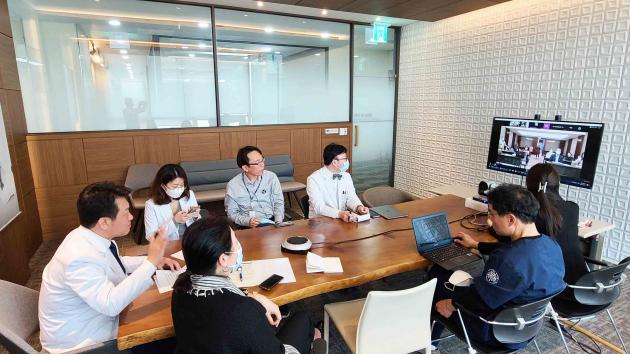Amid mounting interests overseas in Korea’s handling of the new coronavirus, the nation’s transfer of experiences in treating and dealing with Covid-19 has also been continuing. One of the key players in the private sector is Myongji Hospital.
On Thursday, the hospital, situated in Goyang, just north of Seoul, held back-to-back webinars – one with the Indonesian Doctors Association (IDA), and the other with the members of the International Hospital Federation (IHF) – sharing its experiences in curing and responding to the new coronavirus.
In late March, too, Myongji Hospital held similar webinars on four occasions with government officials and experts dealing with disasters from 161 U.N. nations, the members of MAYO Clinic Care Network, and orthopedists around the world. The webinar, a combined word of web and seminar, allows interactive communication between the lecturer and participants.

At 6 p.m. on Thursday, about 100 IHF members and hospital directors participated in the IHF Covid-19 webinar.
Myongji Hospital doctors, including Chairman Lee Wang-jun and Professor Kang Yu-min of Department of Infectious Disease, shared Korea’s experiences in treating confirmed patients, clinical data, projects under research, and response strategy by timeline.
Chairman Lee made a comprehensive briefing, including the epidemiological characteristics of Koreans, details of cluster outbreaks in Daegu and North Gyeongsang Province, and Korea’s response strategy and diagnosis to fight Covid-19 since the first patient was confirmed on Jan 20.
Lee also introduced the preemptive response that Myongji Hospital has taken to fight Covid-19 and its results, which is considered as one of the most exemplary cases in Korea.
Professor Kang, one of the frontline Covid-19 fighters, explained treatment procedures such as medications, outpatient therapies, and selective screenings based on her experience.
The webinar was initially planned for 40 minutes, but it had to extend for an additional 50 minutes because of the rush of questions from foreign participants. IHF members showed a keen interest in crucial factors in the hospital’s leadership, emergency response task force, decision-making system, and communication channels.
They also asked about the role of the Korean Hospital Association amid the pandemic as well as the difficulties facing the Korean hospitals, ranging from financial burden and operational losses to decreasing patients, protective clothing, and the way to resolve the shortage.
Earlier in the day, the Indonesian doctors’ group invited the hospital to learn about Korea’s Covid-19 countermeasures and how Myongji Hospital tested and treated patients.
Attending the webinar were not only the members of IDI, relevant government officials, and medical experts but also many members of the association of Korean residents in the Southeast Asian country, reflecting their interests.
Indonesian participants at the webinar requested Cancer Rop, a subsidiary of the hospital, which recently developed the Covid-19 test kit, to join the event to know about the diagnostic capability of Korean test kits.
During the session, participants had in-depth discussions regarding the real-time polymerase chain reaction test kit jointly developed by Myeongji Hospital and Cancer Rop. They were interested in importing the test kits as well as the support of personnel who will hand over know-how on diagnoses, such as sample collection and analysis.

